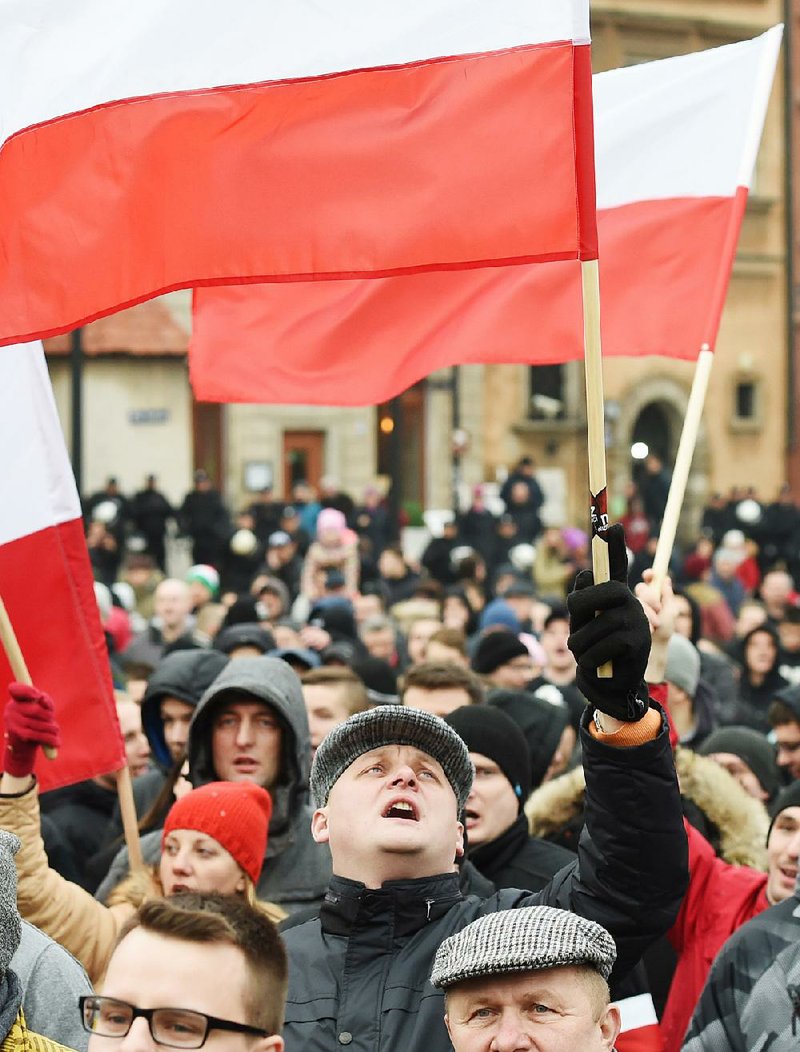AMSTERDAM -- European Union nations anxious to stem the flow of asylum seekers entering through the Balkans are increasingly considering sending more help to nonmember Macedonia as a way to protect European borders instead of relying on EU member Greece.
RELATED ARTICLE
http://www.arkansas…">Syrians mass outside Turkey
With Athens unable to halt the tens of thousands of people making the sea crossing from Turkey, EU nations fear that Europe's Schengen border-free travel zone could collapse.
"If Greece is not ready or able to protect the Schengen zone and doesn't accept any assistance from the EU, then we need another defense line, which is obviously Macedonia and Bulgaria," Hungarian Foreign Affairs Minister Peter Szijjarto said at Saturday's meeting of EU foreign ministers in Amsterdam.
An estimated 850,000 migrants arrived in Greece in 2015, overwhelming its coast guard and reception facilities. Aid groups said Greece has shelter for only about 10,000 people, just over 1 percent of those who have entered. Most of the asylumseekers then travel across the Balkans and into Germany and beyond.
Szijjarto said EU nations are "defenseless from the south. There are thousands of irregular migrants entering the territory of the EU on a daily basis."
Austrian Foreign Minister Sebastian Kurz said the cash-strapped government in Athens still underestimates the crisis.
"I still don't have the feeling that it has dawned on Greece how serious the situation is" for nations such as Austria that receive migrants, he said.
The situation has pushed some EU nations to send aid to Macedonia to control its border with EU member Greece. There has even been talk of sending troops to Macedonia to beef up the Greek border.
"The essential thing is that we have people and equipment to control the border and do registration where legal crossing should happen," Macedonian Foreign Minister Nikola Poposki said after the meeting.
He said Macedonia has already put its military on the job.
Because of the relentless influx of people, several EU members have re-imposed border crossings to better manage the flow into their nations. EU officials, however, are doing their utmost to keep the Schengen zone as open as possible and want member states to focus on reinforcing the zone's external borders only.
The EU is also pushing for Turkey to make a better effort to make sure that refugees from the Syrian war do not make the dangerous sea crossing. EU nations have committed $3.3 billion to Turkey for helping refugees, part of incentives aimed at persuading it to do more to stop thousands of migrants from leaving for Greece.
The EU also called on Turkey to open its borders to thousands of Syrians fleeing government offensives and Russian airstrikes and said it is providing aid to Ankara for that purpose.
"Unquestionably, the fact [is] that people coming from inside Syria are Syrians in need for international protection," EU foreign policy chief Federica Mogherini said Saturday. "On top of that: The support that the EU is providing to Turkey, among others, is aimed exactly at guaranteeing" that Ankara can protect and host Syrians needing asylum.
EU foreign ministers met with their Turkish counterpart for informal talks in Amsterdam on Saturday to drive home that message.
A Russian-backed offensive by Syrian government troops drove throngs of people out of Aleppo, a rebel stronghold, adding to the numbers en route to Europe after more than 1 million arrived last year.
Turkey has already let in 5,000 people escaping Aleppo "and another 50,000-55,000 are on their way," Turkish Foreign Minister Mevlut Cavusoglu said in Amsterdam.
Meanwhile, protesters rallied against Islam and immigration in several European cities Saturday, sometimes clashing with police or counterdemonstrators amid growing tensions over the influx of asylum seekers.
Riot police clashed with demonstrators in Amsterdam as supporters of the anti-Islam group Patriotic Europeans against the Islamization of the West tried to hold their first protest in the Dutch capital. Only about 200 supporters were present, outnumbered by police and leftist demonstrators who shouted, "Refugees are welcome, fascists are not!"
Dutch riot police detained several people as officers on horseback intervened to separate the two groups of demonstrators. It was not immediately clear how many people were detained.
In Germany, up to 8,000 people took part in the anti-Islam group's rally in Dresden, according to the independent group Durchgezaehlt, which monitors attendance figures. Up to 3,500 people took part in a counterdemonstration on the other side of the Elbe River that divides the city, Durchgezaehlt said.
No incidents were reported at the event.
In the northern French city of Calais, police dispersed a rowdy anti-migrant protest with tear gas after clashes with protesters. Authorities detained several far-right demonstrators.
Information for this article was contributed by Mike Corder, Raf Casert and staff members of The Associated Press and by James G. Neuger and Patrick Donahue of Bloomberg News.
A Section on 02/07/2016

